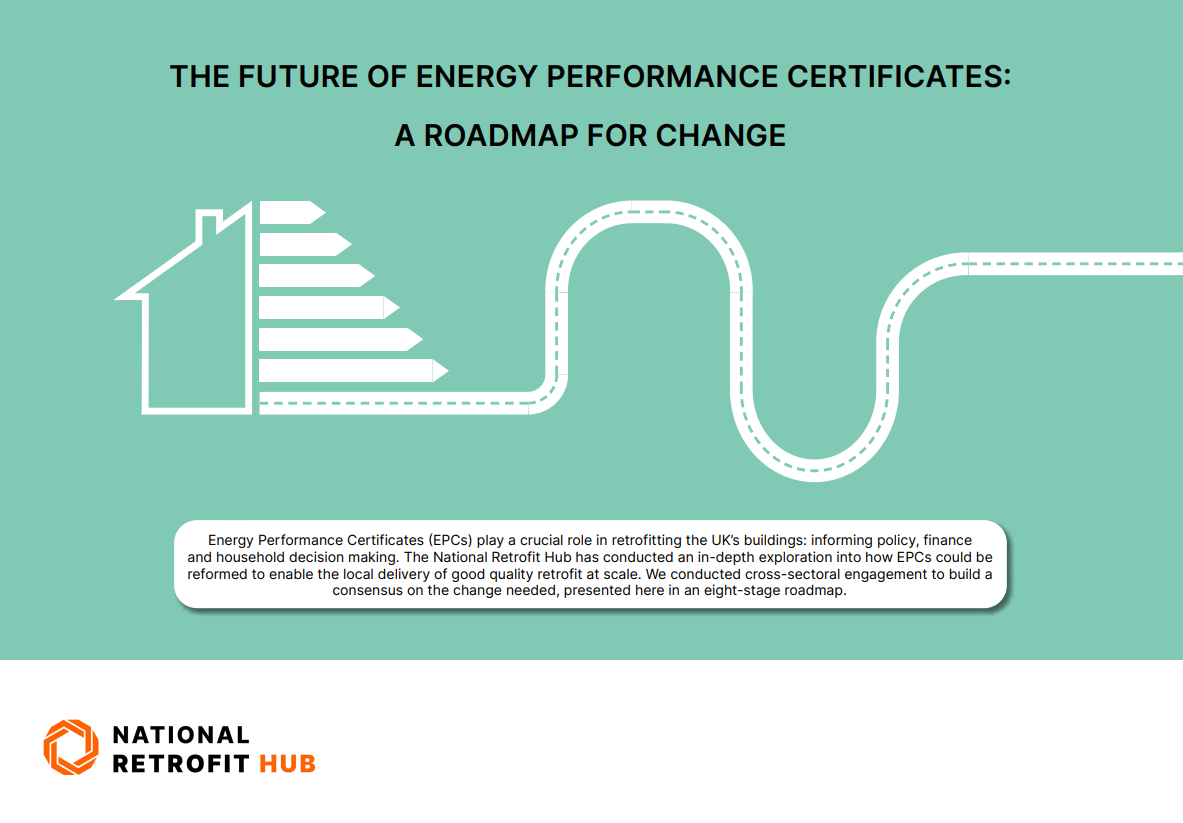The National Retrofit Hub has conducted an in-depth exploration into how EPCs could be reformed to enable the local delivery of good quality retrofit at scale, and is presented here in an eight-stage roadmap.
Energy Performance Certificates (EPCs) play a crucial role in retrofitting the UK’s buildings: informing policy, finance, and household decision making. The National Retrofit Hub has conducted an in-depth exploration into how EPCs could be reformed to enable the local delivery of good quality retrofit at scale. We conducted cross-sectoral engagement to build a consensus on the change needed, presented here in an eight-stage roadmap.
EPC reform
 EPCs play a crucial role in advancing the UK’s retrofit goals by enabling professionals to assess building performance and inform decision-making. However, the current EPC system has faced widespread critique, with calls for reform to make it a more effective tool for large-scale, high-quality retrofit initiatives.
EPCs play a crucial role in advancing the UK’s retrofit goals by enabling professionals to assess building performance and inform decision-making. However, the current EPC system has faced widespread critique, with calls for reform to make it a more effective tool for large-scale, high-quality retrofit initiatives. Report methodology
This work has been supported by a range of organisations and was made possible through engagement across all sectors that are impacted by retrofit.
Literature review
We collected reports on EPC reform from across and beyond the built environment sector, utilising desktop research and recommendations from our network. We identified the key topics, and wrote a short summary of the recommendations included in each report. We identified the following common themes found within reports calling for EPC reform, and used these to structure our next steps:
- Presentation and accessibility
- Consumer awareness
- Upgrade recommendations
- Metrics
- Validity period
- Scope and purpose of EPCs
- EPC data access
- Assessor training and competence
- Finance
Engagement
We explored the common themes within a series of engagement workshops, each focusing on a different stakeholder group. The workshops we convened and facilitated were as follows:
- Standards, technical design, and project planning: Over 100 industry professionals from the National Retrofit Hub’s Working Groups 1 and 2.
- Financial specialists: 30 banks, building societies, and financial professionals, convened in partnership with Bankers 4 Net Zero.
- Citizen engagement: Over 60 consumer advice, communications, and community representatives from the National Retrofit Hub Working Group 6.
Industry survey and expert feedback
We then utilised an audience engagement platform (Mentimeter), with interactive polls and comment boxes, alongside open discussion to explore a selection of the common themes.
Finally, we tested key attitudes, thoughts, perceptions, and recommendations within a broad industry survey, conducted in collaboration with Futurebuild. The survey collected insights from over 300 people within and beyond the sectors influenced by retrofit. Respondent included: consultants, designers, academics, community organisation members, contractors, installers, developers, finance professionals, local authorities, manufacturers, merchants, charities, and more.
We also utilised on-to-one discussions with industry experts, and consulted with the National Retrofit Hub advisory panel to finalise proposals in this report.
